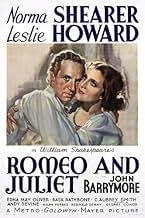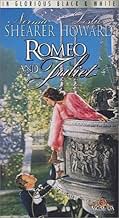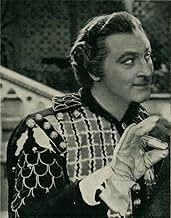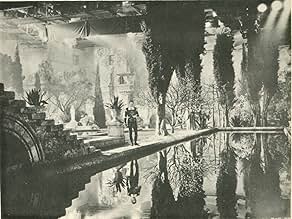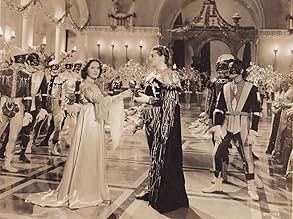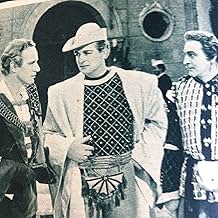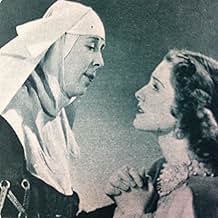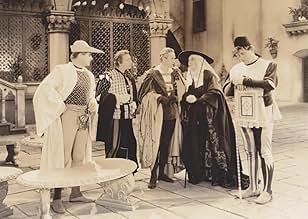VALUTAZIONE IMDb
6,5/10
2364
LA TUA VALUTAZIONE
Aggiungi una trama nella tua linguaYoung love is poisoned by a generations long feud between two noble families.Young love is poisoned by a generations long feud between two noble families.Young love is poisoned by a generations long feud between two noble families.
- Regia
- Sceneggiatura
- Star
- Candidato a 4 Oscar
- 4 vittorie e 5 candidature totali
Charles Bancroft
- Nobleman
- (non citato nei titoli originali)
Dean Benton
- Minor Secondary Role
- (non citato nei titoli originali)
Carlyle Blackwell Jr.
- Tybalt's Page
- (non citato nei titoli originali)
John Bryan
- Friar John
- (non citato nei titoli originali)
Recensioni in evidenza
Unlike so many of the other commentators below, I am not a fan of Ms. Shearer. In her opening scene, she gushily keeps herself wide-eyed and smiling--all the time acting innocent, while Olivia Hussey and other screen Juliets don't have to act innocent: they are innocent.
That said, this film has much to offer, despite its lacking the passion of other more recent versions. The verse is spoken well, and Barrymore is brilliant as Mercutio. Yes, he's pure ham---but a succulent one. His Mercutio is, as the character's name implies, mercurial as well as absurdist, ironic, and virile. Rathbone is like a living rapier and gets my vote as the best Tybalt the screen has ever seen. However, don't believe producer Thalberg's ballyhoo that every word spoken in this film is from Shakespeare's play: it isn't, although it's close.
That said, this film has much to offer, despite its lacking the passion of other more recent versions. The verse is spoken well, and Barrymore is brilliant as Mercutio. Yes, he's pure ham---but a succulent one. His Mercutio is, as the character's name implies, mercurial as well as absurdist, ironic, and virile. Rathbone is like a living rapier and gets my vote as the best Tybalt the screen has ever seen. However, don't believe producer Thalberg's ballyhoo that every word spoken in this film is from Shakespeare's play: it isn't, although it's close.
Despite the fact we have a 47 year old Romeo, a 36 year old Juliet, and a 54 year old Mercutio; George Cukor's production for MGM of Romeo and Juliet manages to entertain and well.
Of course these protagonists are all teenagers, but these players have all played romantic parts in an age when romance was not something to be cynical about and they do fit their roles well. No Romeo was ever more dashing than Leslie Howard or a Juliet as passionate as Norma Shearer.
John Barrymore as Mercutio is a bit of an exception. I look at him and I think of another Shakespearean character who simply doesn't want to grow up and spends his time with the young blades of his day at the tavern. That would be Falstaff in Henry IV in both parts and if you think of Barrymore's Mercutio in that way, his interpretation makes a lot of sense.
My favorite in this film has always been Tybalt and Basil Rathbone plays him with fire and passion. Rathbone got an Academy Award nomination, the first of two, for Best Supporting Actor in the first year Supporting Actor Awards were given out. He lost however to Walter Brennan in Come and Get It. He's just spoiling for a fight with some Montagues and in the end he unfortunately gets one.
Romeo and Juliet is insightful into the Italy of the times. Italy was a geographical expression not a nation. In fact it was ruled mostly by the German entity, the Holy Roman Empire. But inside the empire and out it was a succession of petty states, constantly at war with each other. Sometimes the causes of the wars were long forgotten, but the hostilities took on a life of their own.
Right down to a couple of wealthy families in the small town of Verona where the prince there has his hands full trying to keep the Montague and Capulet feud from spilling over into violence every time some of them meet in his town.
With this background a young prince of Montague just getting over another bad romance and a princess of Capulet whose father has her slated to marry another meet and fall in love. Even when they find out their respective pedigrees, it makes no difference.
In fact the idea that love can bridge all barriers is what I believe makes Romeo and Juliet as popular as it is. It's a lesson people and nations could learn.
Norma Shearer got an Oscar nomination for playing Juliet, but lost to Luise Rainer in The Great Ziegfeld as Best Actress. George Cukor and the film itself also were up, but lost for best director and best picture.
Andy Devine plays the small part of Peter, a Capulet servant and I'm sure you're wondering what Andy Devine was doing in Shakespeare. So did he when he was cast in the part. The story goes that he went to George Cukor and told him he hadn't foggiest idea what he was doing in a classic Shakespeare play, he'd never done anything like this. Cukor supposedly told him, that was to his credit and that he would be the only member of the cast who would not be telling him how to direct the film. Turned out Cukor was right, but the film got made.
And that's definitely for the better.
Of course these protagonists are all teenagers, but these players have all played romantic parts in an age when romance was not something to be cynical about and they do fit their roles well. No Romeo was ever more dashing than Leslie Howard or a Juliet as passionate as Norma Shearer.
John Barrymore as Mercutio is a bit of an exception. I look at him and I think of another Shakespearean character who simply doesn't want to grow up and spends his time with the young blades of his day at the tavern. That would be Falstaff in Henry IV in both parts and if you think of Barrymore's Mercutio in that way, his interpretation makes a lot of sense.
My favorite in this film has always been Tybalt and Basil Rathbone plays him with fire and passion. Rathbone got an Academy Award nomination, the first of two, for Best Supporting Actor in the first year Supporting Actor Awards were given out. He lost however to Walter Brennan in Come and Get It. He's just spoiling for a fight with some Montagues and in the end he unfortunately gets one.
Romeo and Juliet is insightful into the Italy of the times. Italy was a geographical expression not a nation. In fact it was ruled mostly by the German entity, the Holy Roman Empire. But inside the empire and out it was a succession of petty states, constantly at war with each other. Sometimes the causes of the wars were long forgotten, but the hostilities took on a life of their own.
Right down to a couple of wealthy families in the small town of Verona where the prince there has his hands full trying to keep the Montague and Capulet feud from spilling over into violence every time some of them meet in his town.
With this background a young prince of Montague just getting over another bad romance and a princess of Capulet whose father has her slated to marry another meet and fall in love. Even when they find out their respective pedigrees, it makes no difference.
In fact the idea that love can bridge all barriers is what I believe makes Romeo and Juliet as popular as it is. It's a lesson people and nations could learn.
Norma Shearer got an Oscar nomination for playing Juliet, but lost to Luise Rainer in The Great Ziegfeld as Best Actress. George Cukor and the film itself also were up, but lost for best director and best picture.
Andy Devine plays the small part of Peter, a Capulet servant and I'm sure you're wondering what Andy Devine was doing in Shakespeare. So did he when he was cast in the part. The story goes that he went to George Cukor and told him he hadn't foggiest idea what he was doing in a classic Shakespeare play, he'd never done anything like this. Cukor supposedly told him, that was to his credit and that he would be the only member of the cast who would not be telling him how to direct the film. Turned out Cukor was right, but the film got made.
And that's definitely for the better.
The fine cast and production make this adaptation of "Romeo & Juliet" a satisfying one, both as a movie and as a realization of Shakespeare's play. Most of the cast is matched up very well with their characters, and the lavish settings provide a good backdrop for the drama.
Although it's soon clear that Leslie Howard and Norma Shearer are quite a bit older than the original characters were, in other respects they are well cast. Shearer's eager innocence and Howard's refinement fit together well, and although they are clearly not the teenage characters of the original, their romance is believable and convincing in itself.
The other roles include some nice casting. Reginald Denny as the loyal Benvolio, Basil Rathbone as the hard-hearted Tybalt, and Edna May Oliver as Juliet's bustling nurse are all enjoyable to watch. But the highlight of the cast is John Barrymore, who steals every scene as the fun-loving, ill-fated Mercutio, a character who is well-suited to Barrymore's strengths. It's a blessing that at least one of Barrymore's numerous Shakespearean roles was captured in a film for posterity.
The script abridges many of the scenes for cinematic purposes, and it does well in fleshing out the basic story with the duels, festivities, and other events, at times also dramatizing developments that in the original text are only mentioned by the characters. Overall, it is a well-conceived, well-executed, and enjoyable movie version of the famous story.
Although it's soon clear that Leslie Howard and Norma Shearer are quite a bit older than the original characters were, in other respects they are well cast. Shearer's eager innocence and Howard's refinement fit together well, and although they are clearly not the teenage characters of the original, their romance is believable and convincing in itself.
The other roles include some nice casting. Reginald Denny as the loyal Benvolio, Basil Rathbone as the hard-hearted Tybalt, and Edna May Oliver as Juliet's bustling nurse are all enjoyable to watch. But the highlight of the cast is John Barrymore, who steals every scene as the fun-loving, ill-fated Mercutio, a character who is well-suited to Barrymore's strengths. It's a blessing that at least one of Barrymore's numerous Shakespearean roles was captured in a film for posterity.
The script abridges many of the scenes for cinematic purposes, and it does well in fleshing out the basic story with the duels, festivities, and other events, at times also dramatizing developments that in the original text are only mentioned by the characters. Overall, it is a well-conceived, well-executed, and enjoyable movie version of the famous story.
This production got glitsy treatment by production head Irving G. Thalberg, who was showcasing his wife, Norma Shearer, playing Juliet: two years of research, a crew sent to Verona to photograph parts of the city; reconstruction of Verona's Church of San Zeno on the back-lot; thousands of extras; beautiful costumes and sets, etc. Although the screenplay was shortened, Thalberg also insisted that only Shakespeare's words were to be used in the dialogue. That would be a pleasure for those who knew the play, but a bane for those who didn't. Shakespeare's spoken dialogue isn't very easy to understand. Like any foreign language you learned a little bit in school, you can translate written material and get the gist of what is going on, but try deciphering normal speech in that language and you will be lost. I had a difficult time understanding some of the speeches (almost nothing that John Barrymore was saying) - they flew by me too fast. (On the other hand, I studied Hamlet and Macbeth in school and relish watching movie versions of those plays.) Still, I enjoyed this film, since I knew the general story, and there were sections that didn't tax my knowledge of Shakespearean English. Some of the lines were beautiful. I never new that the expression "star-crossed lovers" was Shakespeare's. Edna May Oliver's comedy was superbly played and the acting of the rest of the cast was excellent. The title characters were supposed to be teenagers, so that both Leslie Howard (at 54) and Norma Shearer (at 31) were a bit old for their parts, but that was a minor point. My advice to anyone wishing to watch this film: read the play first!
The lavish treatment given to this by MGM and Irving Thalberg (his final production showcasing his wife Norma Shearer as Juliet) does work, as do the mature lovers and their supporting cast (Leslie Howard fitting the part of Romeo perfectly, John Barrymore and Basil Rathbone out-swashing each other as Mercutio and Tybalt), Edna May Oliver as the Nurse, typically loud, and Ralph Forbes as a bizarre Paris (no, I can't see why Juliet would want to marry him either, despite her parents' wishes). The music is lovely, despite being stolen from more classical stuff, the settings are perfectly in tune, the verse is spoken with some feeling and inspiration. Why this version doesn't get seen more often I don't know (not even on video in the UK).
Lo sapevi?
- QuizThe film contains the only on-screen sword fight that expert swordsman Basil Rathbone won in his entire film career.
- Citazioni
Juliet - Daughter to Capulet: My bounty is as boundless as the sea, My love as deep. The more I give to thee, The more I have, for both are infinite.
- ConnessioniFeatured in Master Will Shakespeare (1936)
I più visti
Accedi per valutare e creare un elenco di titoli salvati per ottenere consigli personalizzati
- How long is Romeo and Juliet?Powered by Alexa
Dettagli
- Data di uscita
- Paese di origine
- Sito ufficiale
- Lingua
- Celebre anche come
- Romeo and Juliet
- Luoghi delle riprese
- Azienda produttrice
- Vedi altri crediti dell’azienda su IMDbPro
- Tempo di esecuzione
- 2h 5min(125 min)
- Colore
- Proporzioni
- 1.37 : 1
Contribuisci a questa pagina
Suggerisci una modifica o aggiungi i contenuti mancanti


